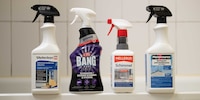
Guide
Four anti-mould agents in comparison
by Simon Balissat

Sometimes less is more. This is absolutely true for so-called quaternary ammonium compounds (QACs), which are increasingly found in disinfectants. They not only harm the environment, but can exacerbate long-term health issues.
Studies suggest a connection with asthma, dermatitis, inflammation, infertility and birth defects. In addition, there has been evidence since the 1950s that QACs render certain types of bacteria resistant to both the QACs themselves and to important antibiotics.
«It’s ironic that the chemicals we’re deploying in vain for one health crisis are actually fuelling another,» says Erica Hartmann, co-author of the study. «Antimicrobial resistance was already contributing to millions of deaths per year before the pandemic.» Since the pandemic, concentrations of these chemicals have increased in the environment and in our bodies.
In most cases, a bar of soap will do the trick. If you feel that something definitely needs disinfecting, it’s best to use pure alcohol-based disinfectants (e.g. 70% ethanol). They’re just as effective and won’t harm you or the environment.
Header image: naipo/UnsplashScience editor and biologist. I love animals and am fascinated by plants, their abilities and everything you can do with them. That's why my favourite place is always outside - somewhere in nature, preferably in my wild garden.
Practical solutions for everyday problems with technology, household hacks and much more.
Show allAt the beginning of the pandemic, it suddenly became a highly sought-after commodity: disinfectant. Although the excessive use of antimicrobials decreased after some time, there’s still far too much of it in use today. At least according to a warning issued by a team of US scientists. In their report published in the journal Environmental Science & Technology they warn of negative consequences of so-called quaternary ammonium compounds – QACs for short. Even though there are definitely safter alternatives, this potentially hazardous class of substances is increasingly being used in disinfectants – especially in the USA.
«Our review of the science suggests disinfecting with these chemicals in many cases is unhelpful or even harmful,» co-author Courtney Carignan of Michigan State University is quoted in a communication by the Green Science Policy Institute. After all, there have long been indications that QACs not only pollute the environment, but can also be a serious health hazard for humans.
Although QACs aren’t even necessary for disinfection, they’re becoming increasingly common in disinfectant solutions, wipes, sprays and nebulisers. At the same time, the individual substances aren’t always easy to identify. One of the most common QACs is benzalkonium chloride. But you’ll also find other names ending in ammonium chloride or similar listed on labels. There’s an easy way to avoid these unnecessary compounds even without a degree in chemistry. Simply follow the advice of the scientists: «We recommend regularly using soap and water and only using safe disinfectant when necessary.»


Acer Nitro VG271UM3bmiipx
2560 x 1440 pixels, 27"